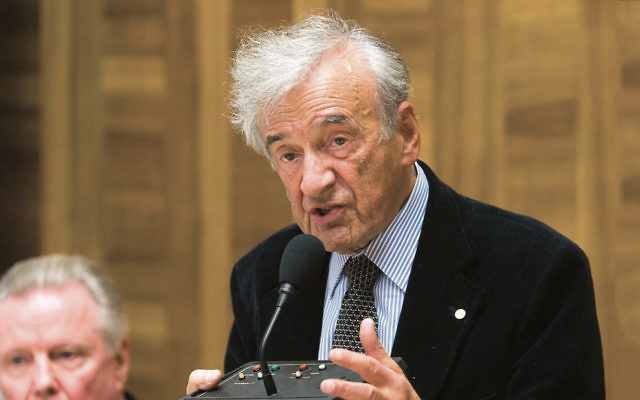Wiesel mourned
Politicians and Jewish leaders have lauded Elie Wiesel, the world’s most famous voice of Holocaust survival, who died aged 87 last Saturday (July 2).

POLITICIANS and Jewish leaders have lauded Elie Wiesel, the world’s most famous voice of Holocaust survival, who died aged 87 last Saturday (July 2). The human rights advocate, novelist, journalist and Nobel Laureate’s passing drew tributes from around Australia.
Prime Minister Malcolm Turnbull mourned Wiesel’s death as “another human link lost to the tragedy of the Shoah, another eyewitness gone to the largest crime of the 20th century”.
“We should also do well to remember his exhortations against the temptations of indifference and silence,” the PM said.
ALP leader Bill Shorten tweeted: “He survived the very worst of humanity, he spoke for its best. RIP Elie Wiesel.”
Former prime minister Julia Gillard reflected that Wiesel “never ceased to call the conscience of the world to account. A humanitarian, he was wholly dedicated to ensure that never again would such crimes against humanity occur.”
Executive Council of Australian Jewry president Robert Goot and executive director Peter Wertheim described Wiesel as “a giant of humanity and among its most powerful voices of conscience. In today’s morally confused and compromised world, his message remains more relevant than ever: Thou shalt not be a bystander. Thou shalt not remain silent in the face of evil.”
Noting Wiesel published more than 40 books translated into many languages, Goot and Wertheim said: “The highest tribute we can pay to Elie Wiesel is to commit ourselves to continue working to fulfil the pledge he made before the whole world when he accepted the Nobel Peace Prize in 1986,” never to be silent in the face of injustice and human suffering.
Moved by Wiesel’s heart-rending accounts as an inmate of Auschwitz and Buchenwald, in his memoir trilogy – comprising the works Night, Dawn and Day – Zionist Federation of Australia president Danny Lamm described Wiesel as “one of the strongest and most eloquent voices to emerge from the dark night of the Shoah. Now we will have to adjust to a new dawn in a world without one of the Jewish people’s truest giants. Through his powerful writing, Wiesel ensured that generations to come would also remember the horrors of the Shoah.
“He also encouraged people never to stay silent on any of the world’s injustices, and this is what made him such a worthy winner of the Nobel Prize and all of the other accolades he received over the years,” Lamm said.
The Australia/Israel & Jewish Affairs Council’s (AIJAC) director of international and community affairs Jeremy Jones – who had worked with Wiesel through the World Jewish Congress, the Conference on Jewish Material Claims Against Germany, and in projects about Jewish education and anti-Semitism – said he “radiated wisdom and compassion, but also humility”.
AIJAC executive director Colin Rubenstein described Wiesel as “a powerful advocate for those whose voices were not being heard … a proud Jew and a passionate supporter of Israel”.
AIJAC’s national chair Mark Leibler said Wiesel “gave voice to victims and survivors of the Shoah as individual human beings, while consistently speaking out on issues of global importance”.
B’nai B’rith Anti-Defamation Commission chair Dvir Abramovich said: “In a world devoid of true heroes, Elie Wiesel was a guardian and a champion of justice and compassion, and a voice for the victims of violence and oppression around the world.”
Further coverage in this week’s AJN.
PETER KOHN
- News
- Colin Rubenstein
- Robert Goot
- Dvir Abramovich
- Bill Shorten
- Tributes
- Jeremy Jones
- Malcolm Turnbull
- Peter Wertheim
- Holocaust
- Author
- Mark Leibler
- Danny Lamm
- Zionist Federation of Australia (ZFA)
- Anti-Defamation Commission
- Australia
- Australia/Israel and Jewish Affairs Council (AIJAC)
- Executive Council of Australian Jewry (ECAJ)

comments